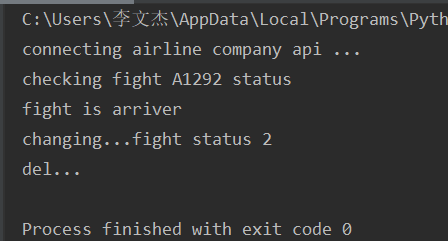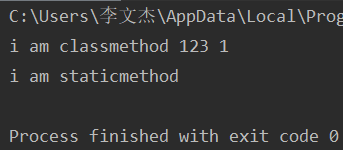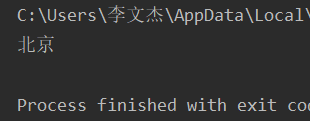面向对象
类方法与静态方法
类方法:类方法通过@classmethod装饰器实现,类方法与普通方法的区别是,类方法只能访问类变量,不能访问实例变量。因为添加classmethod后,self不代表实例,而代表类本身,所以类方法可以直接用类去调用,也可以用实例对象去调用。
静态方法:静态方法不能访问类变量,也不能访问实例变量, 在类中使用 @staticmethod 来修饰的方法属于静态方法,静态方法不需要指定任何的默认参数,静态方法可以通过类和实例去调用,静态方法,基本上是一个和当前类无关的方法,它只是一个保存到当前类中的函数,静态方法一般都是一些工具方法,和当前类无关
class fun(): n = 1 def __init__(self,age): self.age = age pass @classmethod #类方法 def fun1(cls,name): print('i am classmethod',name,cls.n) @staticmethod #静态方法 def fun2(): #此处不能带self,因为不能访问类 变量或实例变量 print('i am staticmethod') a = fun(23) fun.fun1('123') a.fun2()
私有方法,私有变量
类中私有方法,和私有属性,外部无法访问,只能在类的内部访问,在方法前面添加__即可让该方法变成私有方法。私有变量也是类似。
class School(): def __init__(self,name): self.name = name def __city(self): self.__address = '北京' print(self.__address) def call(self): self.__city() sch = School('清华') sch.call()
只读属性
@property装饰器来创建只读属性,@property装饰器会将方法转换为相同名称的只读属性,可以与所定义的属性配合使用,这样可以防止属性被修改。
class Fight(object): def __init__(self,name): self.name = name def checking_status(self): print("connecting airline company api ...") print("checking fight %s status"%self.name) return 1 #1:到达 2:未到达 @property def fight_status(self): #get status = self.checking_status() if status == 0: print("fight got canceled...") if status == 1: print("fight is arriver") if status == 2: print("fight is not arriver") @fight_status.setter def fight_status(self,status): #set print("changing...fight status",status) self.status = status @fight_status.deleter #del def fight_status(self): print("del...") f = Fight("A1292") f.fight_status #将fight_statu方法变为一种属性,不用加()即可调用 f.fight_status = 2 #正常情况下不能对该属性方法赋值,只能重新定义一个fight_status.setter的方法 del f.fight_status






 浙公网安备 33010602011771号
浙公网安备 33010602011771号